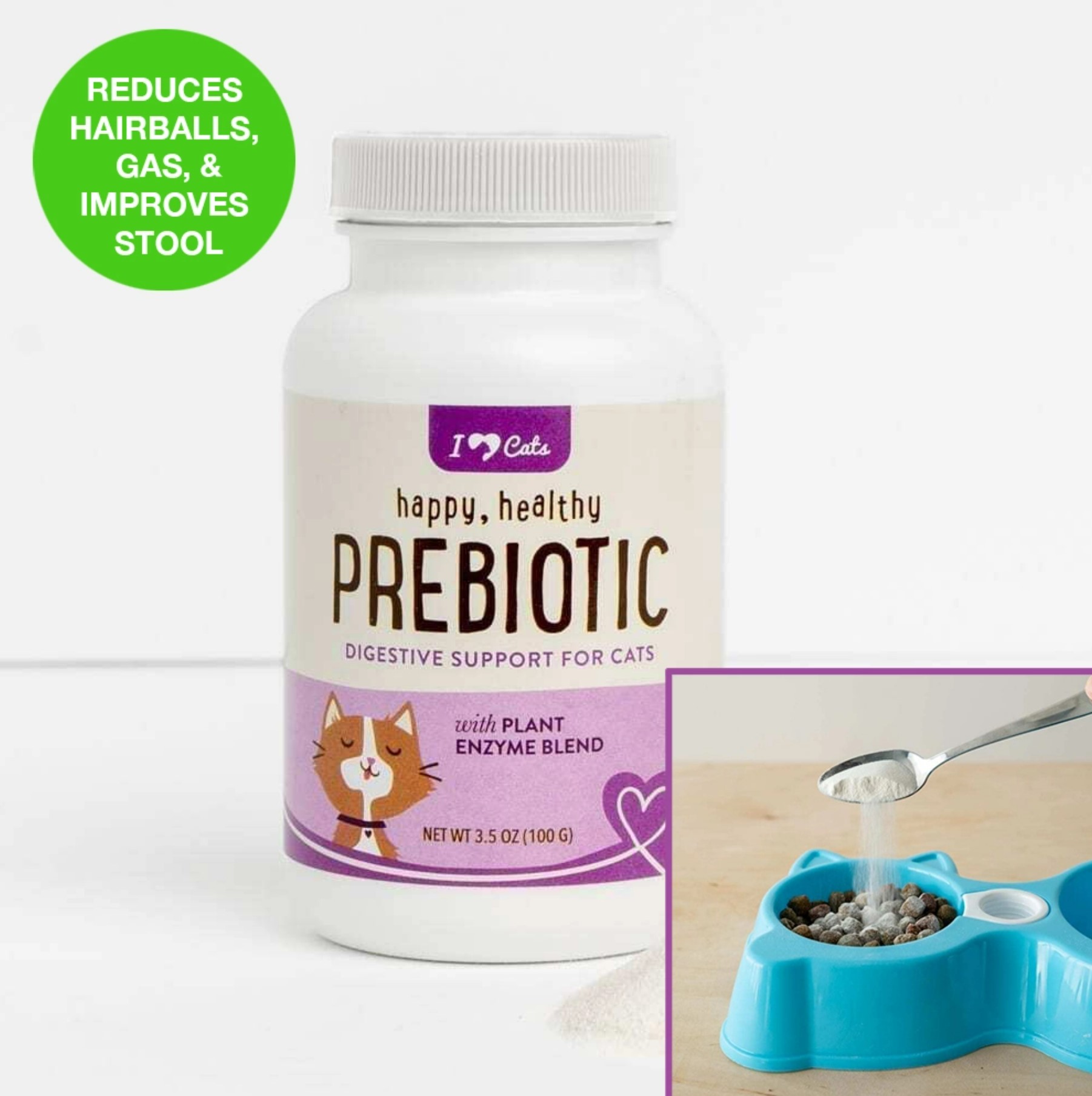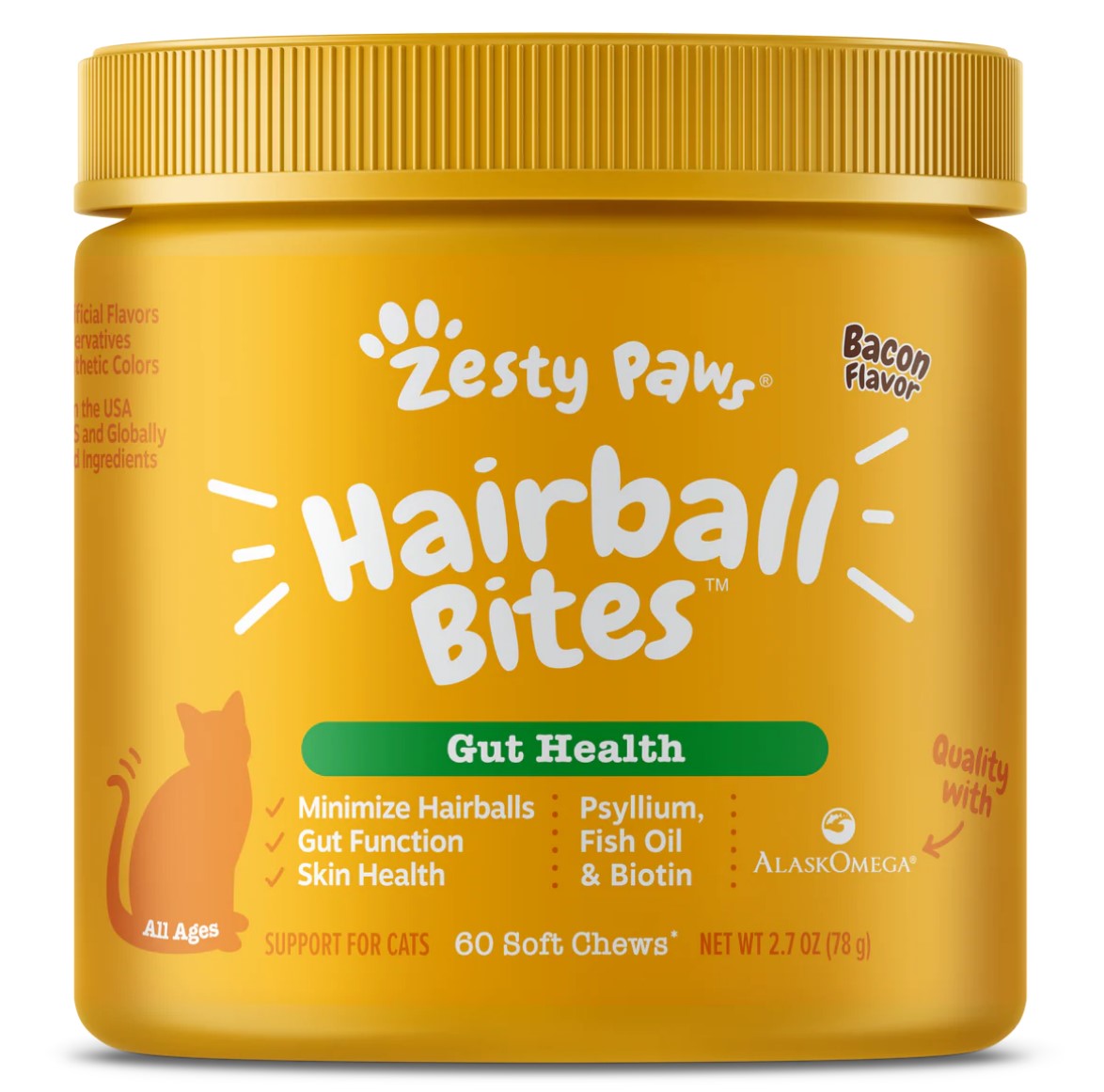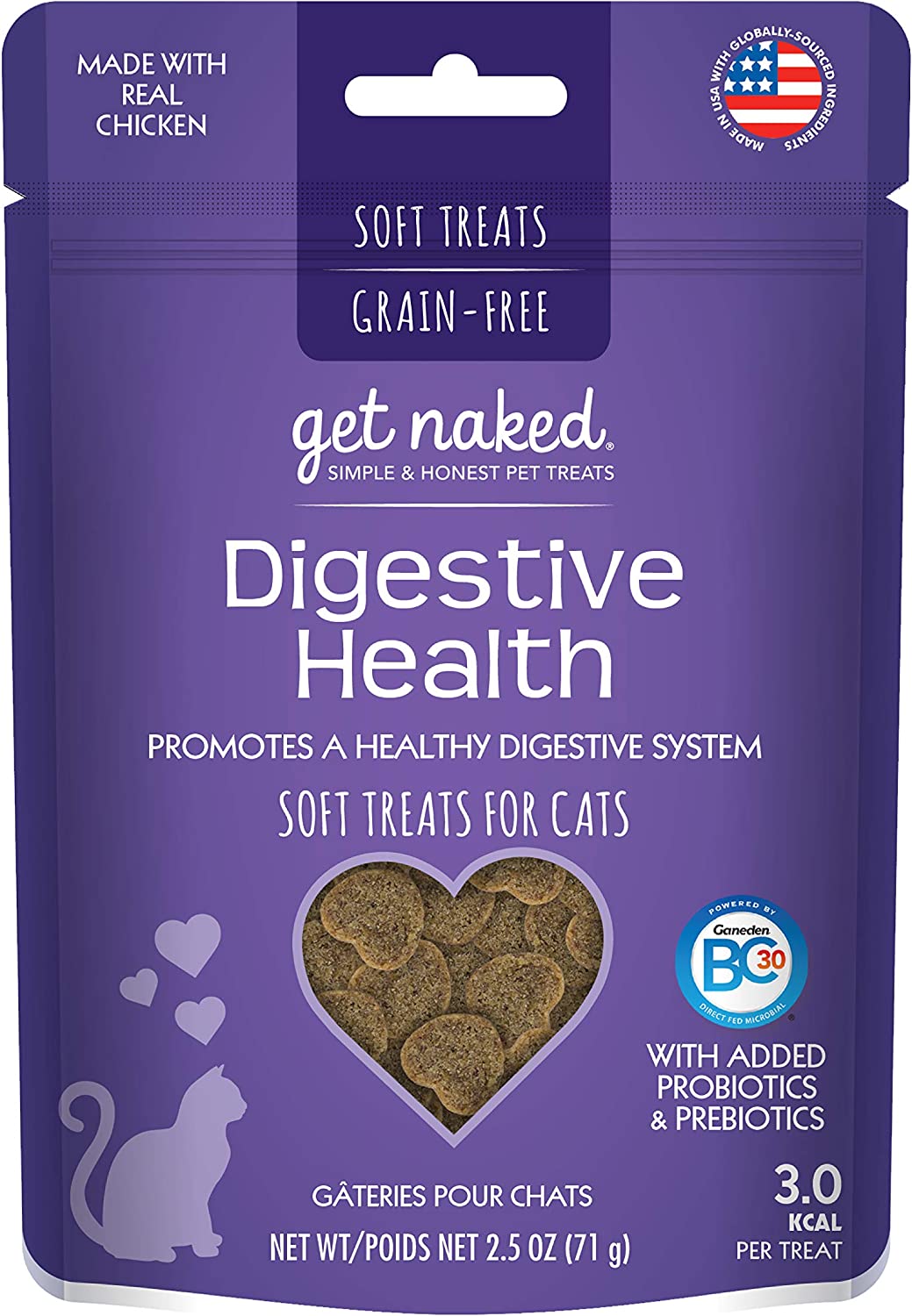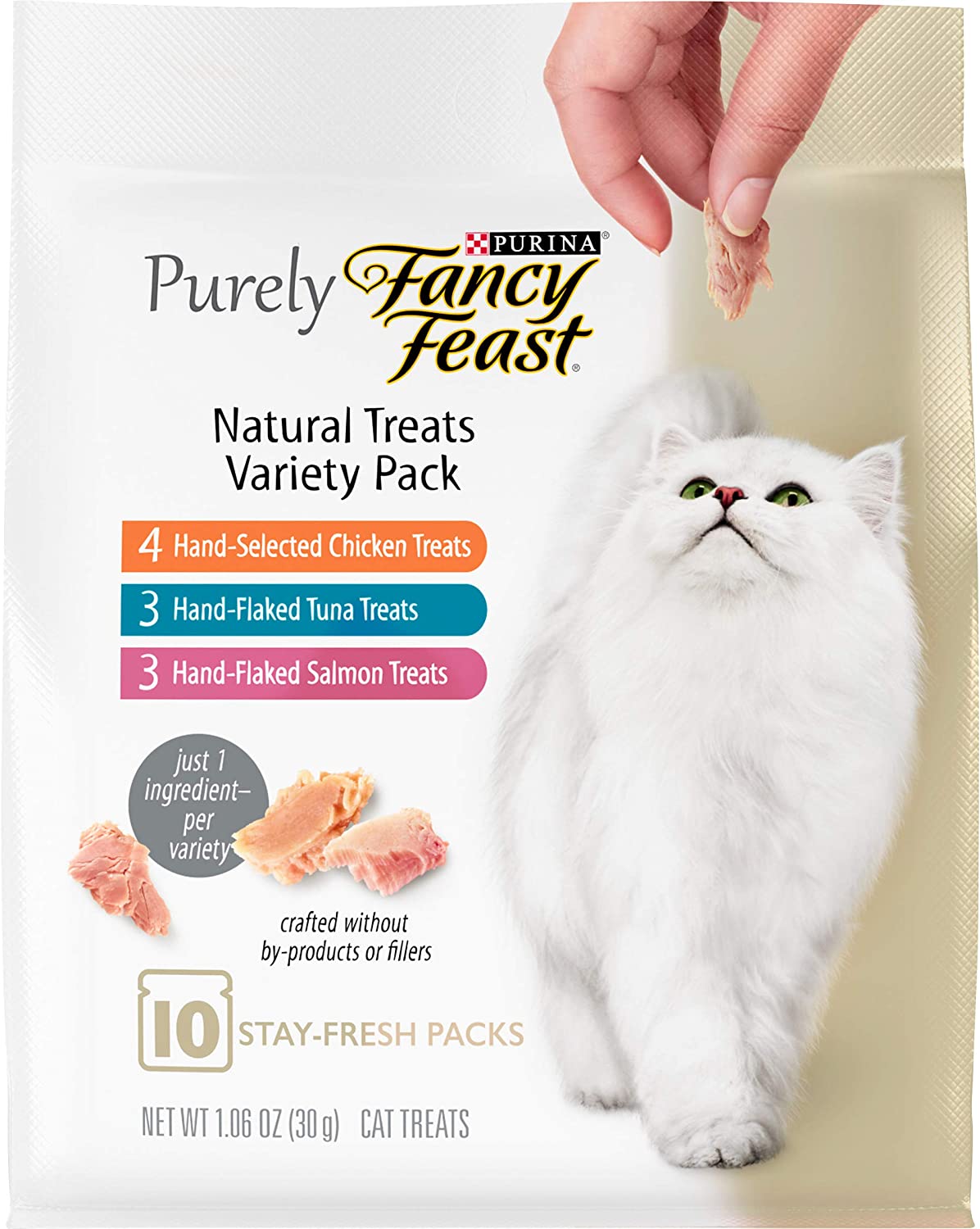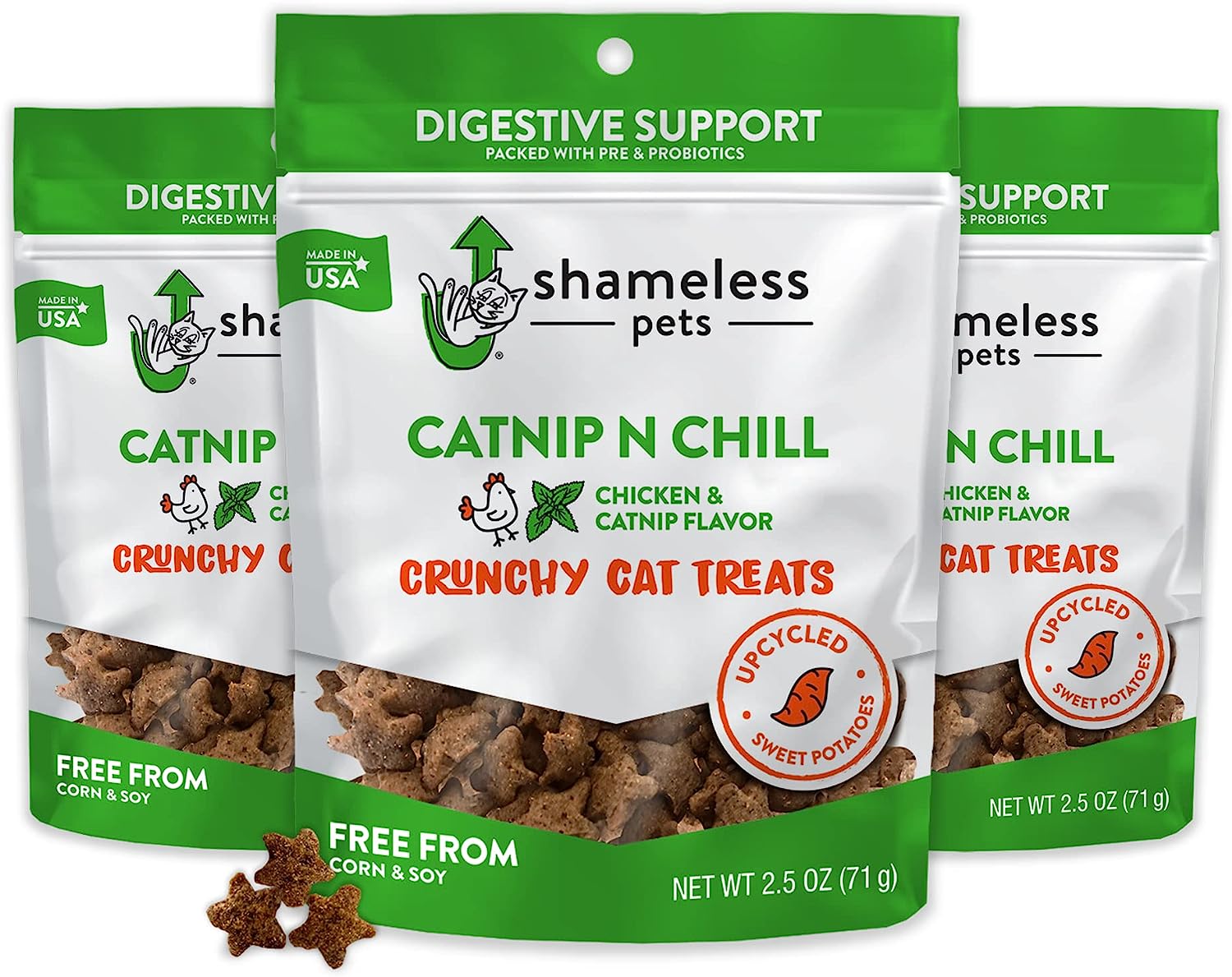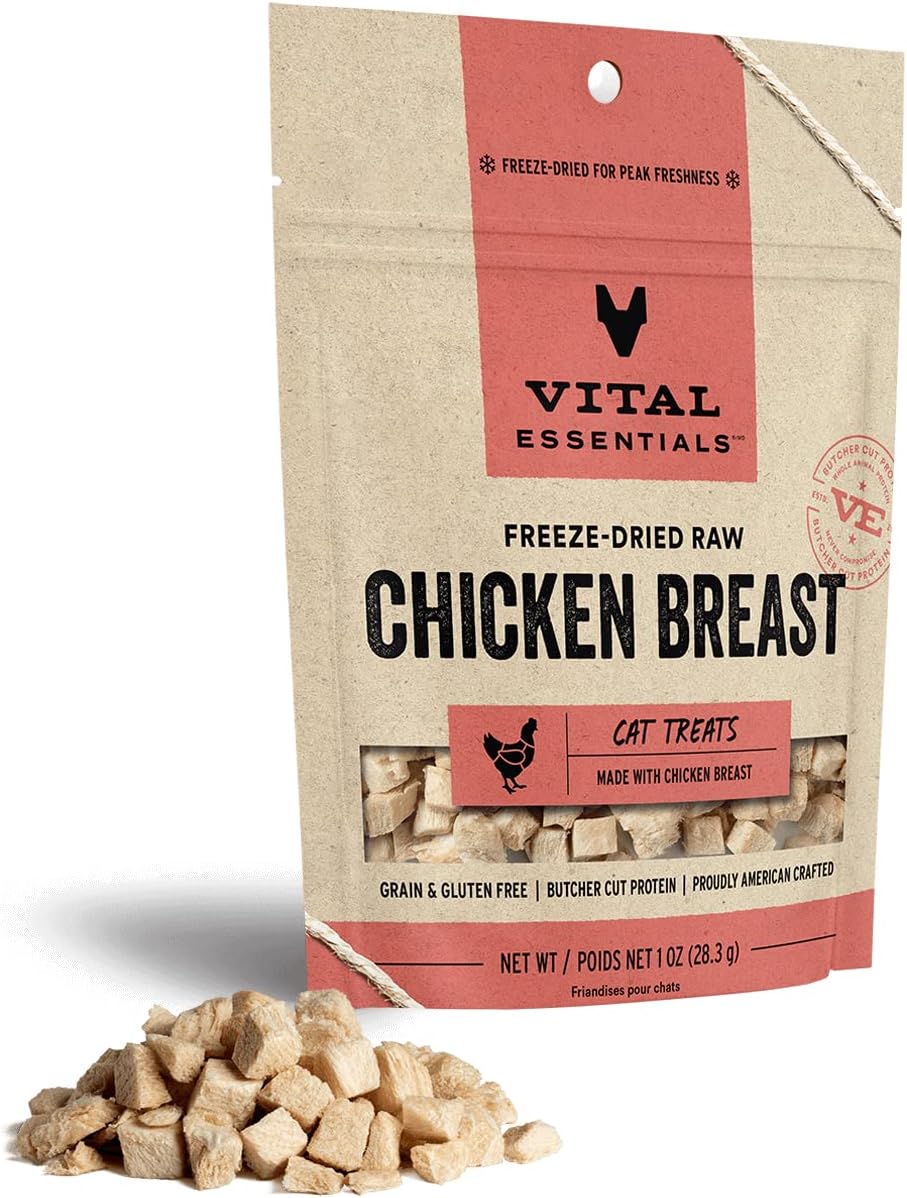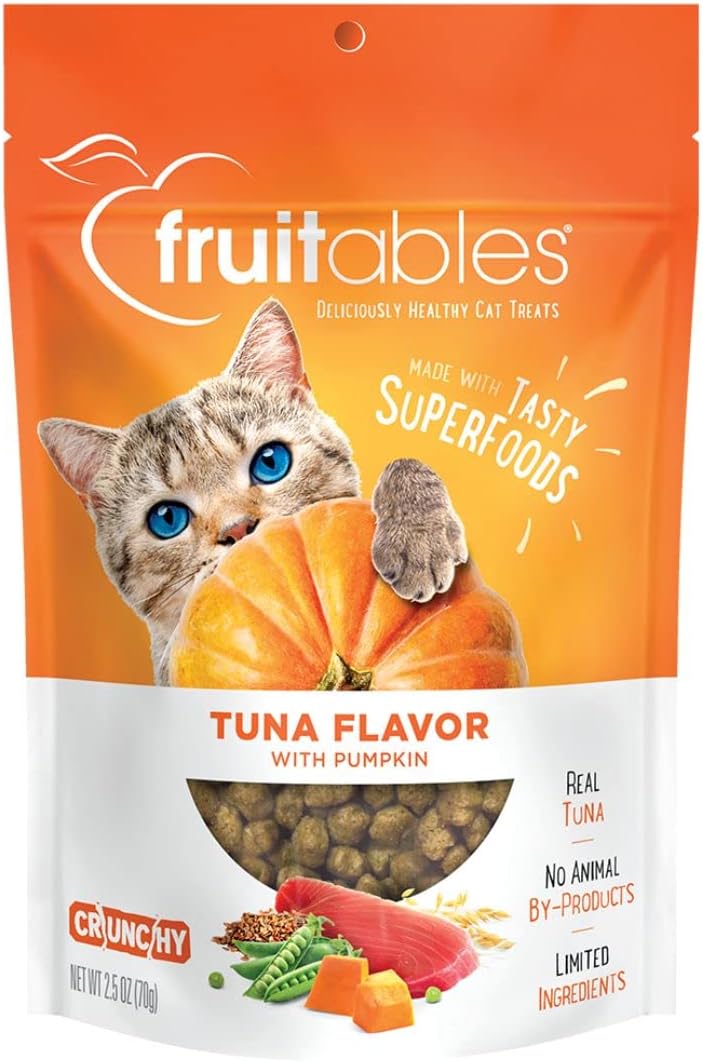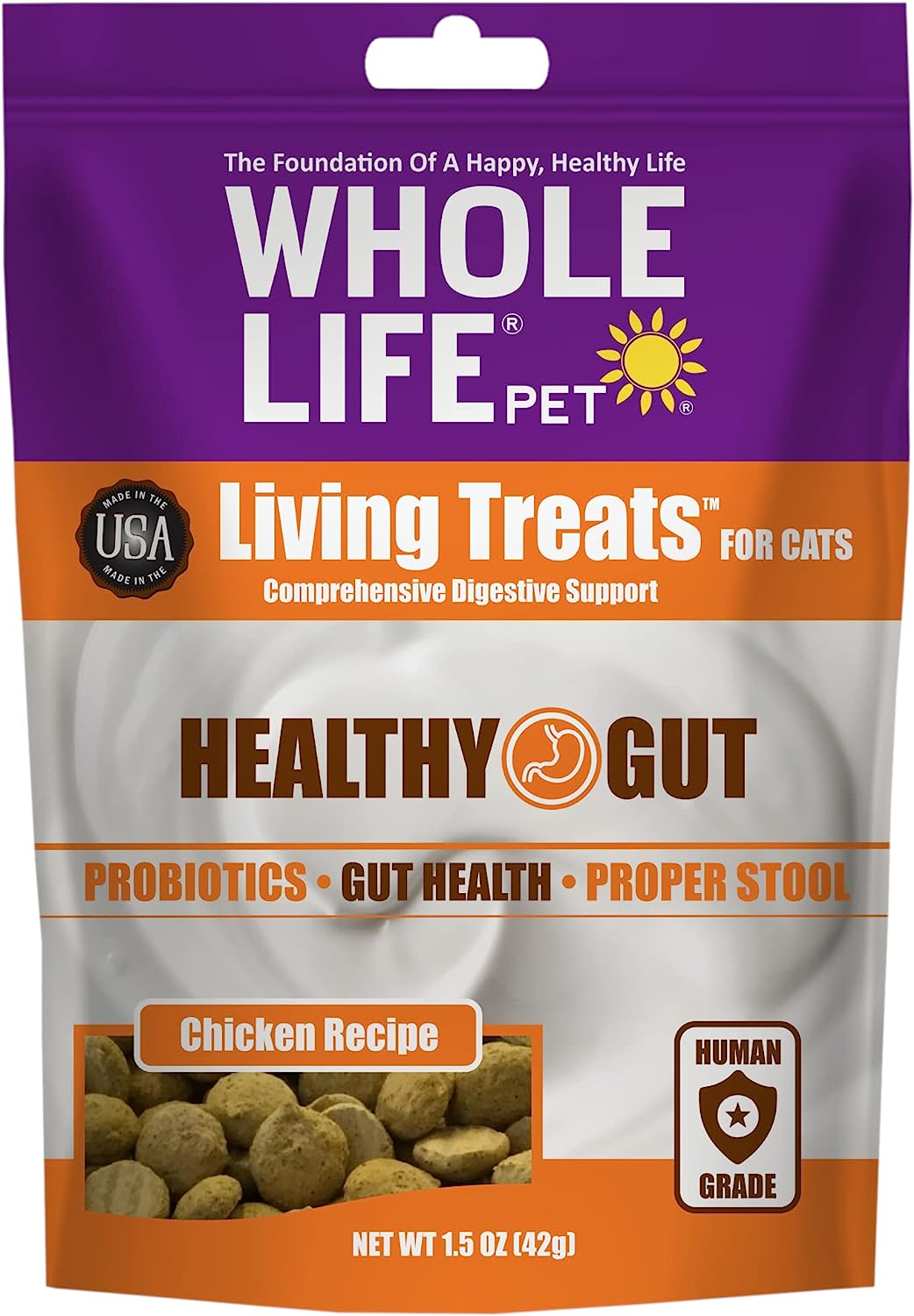iHeartDogs is reader-supported. When you buy via links on our site, we may earn an affiliate commission at no extra cost to you.
Our review of the best cat treats for sensitive stomachs can help you find the perfect treats that won’t upset the delicate feline digestive system and provides your kitty with a delicious and satisfying snack. In this article, we’ll explore the important factors to consider when selecting treats for sensitive stomachs. Plus, you’ll also find the answers to frequently asked questions regarding sensitive stomach cat treats, helping you make informed choices to keep your furry friend happy and healthy.
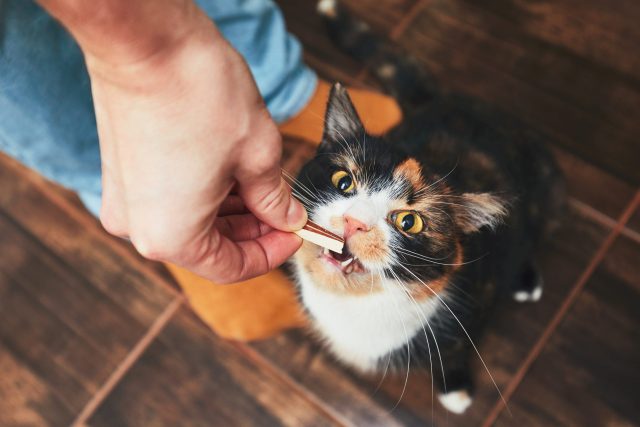
Buyer’s Guide: Factors to Consider When Choosing Sensitive Stomach Cat Treats
When choosing sensitive stomach cat treats, consider the health and well-being of your cat and keep these factors in mind:
Quality Ingredients
Look for treats made from high-quality ingredients. The first few ingredients listed should ideally be a source of animal protein, such as chicken, fish, or turkey. Avoid treats that contain fillers, by-products, and artificial colors, flavors, or preservatives, as these can trigger digestive issues in cats with sensitive stomachs.
Limited Ingredients
Consider treats with a limited number of ingredients. This reduces the chance of potential allergens or irritants that may upset your cat’s stomach. Simple recipes with easily digestible ingredients are often a good choice.
Easily Digestible
Opt for treats specifically formulated to be easily digestible. Look for treats labeled as “easy to digest” or “gentle on the stomach.” These treats are usually made with ingredients that are less likely to cause digestive upset or irritation.
Grain-Free or Low-Grain
Cats with sensitive stomachs often have difficulty digesting grains. Consider treats that are grain-free or have a low grain content. Grain-free treats typically use alternative carbohydrate sources like sweet potatoes or peas, which can be easier on your cat’s stomach.
Hypoallergenic Options
If your cat has known food allergies or sensitivities, consider hypoallergenic treats. These treats are made with novel protein sources (e.g., venison, duck) or hydrolyzed proteins less likely to trigger allergic reactions.
Veterinary Guidance
If your cat has a diagnosed sensitive stomach or chronic digestive issues, it’s best to consult your veterinarian. They can provide specific recommendations based on your cat’s needs, dietary restrictions, and underlying health conditions.
Trial and Observation
Introduce new treats gradually and observe your cat’s response. Watch for signs of digestive upset, such as vomiting, diarrhea, or excessive gas. If your cat doesn’t tolerate a particular treat well, discontinue its use and try another option.
Remember, each cat is unique, and what works for one may not work for another. When selecting sensitive stomach cat treats, pay attention to your cat’s specific needs and preferences. And now, let’s check out who made the list for the best sensitive stomach cat treats!
The Best Cat Treats for Sensitive Stomachs
1 – iHeartCats Prebiotic Digestive Support Supplement
While not exactly a cat treat, your kitty will still find the iHeartCats Prebiotic Digestive Support Supplement an enjoyable food mix-in that helps their tummy feel better. This easy-to-use powder provides comprehensive care for feline digestion with a prebiotic formula that encourages healthy gut flora, thereby enhancing nutrient absorption.
Pros:
- Promotes a healthy immune system
- Can help reduce symptoms of digestive discomfort
- Improves stools
- No artificial additives or preservatives
Cons:
- Not exactly a treat, but it still helps the tummy
- Effectiveness may vary across cats
2 – Zesty Paws Hairball Bites™ for Cats
Also available at Amazon
Zesty Paws Hairball Bites™ for Cats are chewable treats designed to manage hairball formation while keeping the gut healthy. The blend of natural fibers, plant-based oils, and digestive enzymes effectively reduces hairball issues. This specialized formula also includes Psyllium, a fiber that helps support normal gut function and bowel health. And with the addition of AlaskOmega Fish Oil, these soft treats also provide daily Omega-3 fatty acid support (EPA/DHA) to support skin health too.
Pros:
- Helps reduce hairball formation
- Can improve skin and coat health
- Easy to administer
Cons:
- Flavor may not be universally liked
- Overfeeding can result in digestive upset
3 – Get Naked Furball Relief Soft Treats For Cats
Get Naked Furball Relief Soft Treats for Cats provide a tasty solution for hairball problems and tummy issues thanks to the addition of fiber, flaxseed, prebiotics, and probiotics. These treats are also enriched with omega fatty acids for skin and coat health. They’re also free from corn, wheat, and soy for easier digestion.
Pros:
- Assists in managing hairball issues
- Promotes healthier skin and coat
- Tasty and easily accepted by cats
- Free of wheat, soy, and corn
Cons:
- Treat size may be too large for some cats
- Overconsumption can cause gastrointestinal discomfort
4 – Purina Fancy Feast Natural Cat Treats Variety Pack, Purely Natural
Purina Fancy Feast Natural Cat Treats Variety Pack, Purely Natural, is a cat delight. Made with real fish or chicken, these treats offer an enticing flavor. Packaged in convenient pouches, they ensure freshness. These little bits of meat are a hit with cats, whether they have sensitive tummies or not.
Pros:
- Made from high-quality ingredients
- Delicious and enticing for cats
- Convenient, individually-packaged servings
- Limited ingredients for easy digestion
- Thousands of positive ratings and reviews
Cons:
- Some cats may not enjoy all the flavors in the variety pack
5 – SHAMELESS PETS Crunchy Cat Treats – Catnip Treats for Cats with Digestive Support
SHAMELESS PETS Catnip Treats are a purr-fect indulgence for your feline companion. These treats are crafted with wholesome and natural ingredients locally sourced in the USA. What sets these treats apart is the inclusion of organic catnip, which adds an extra dash of feline delight and makes these treats irresistible. The bite-sized pieces are easy to handle and can be used for training or as a special reward. Made with chicken, catnip, and sweet potato, these best cat treats support healthy digestion and may help eliminate hairballs.
Pros:
- Irresistible aroma and flavor for cats
- Uses misfit and surplus sweet potatoes
- Suitable for training or as a special reward
- Brand committed to sustainability and giving back
- Made in the USA
Cons:
- Some cats may not respond to catnip or may not enjoy the flavor
- Packaging may not be resealable, leading to potential freshness concerns
6 – Vital Essentials Freeze Dried Cat Treats, Raw Chicken Breast Treats for Cats
Vital Essentials Freeze Dried Cat Treats, Raw Chicken Breast, delivers a raw diet snack experience in a convenient form. Single-sourced and protein-rich, these meaty bites are a wholesome choice for feline snacking. The minimal ingredient list is a boon for sensitive cats, and a range of flavors will appease picky palates.
Pros:
- High in protein, supporting lean muscles
- Suitable for cats with food sensitivities
- Easy to store and serve
- Grain, gluten-free, and limited ingredient
Cons:
- Freeze-dried texture may not be appealing to all cats
- Crumbly texture can lead to messy feeding times
7 – Fruitables Crunchy Treats For Cats
Fruitables Crunchy Treats For Cats are a healthy, flavorful indulgence. Made with real salmon and enriched with antioxidant-rich fruit, these treats ensure a nutritious snack time. They’re grain-free and have a satisfying crunch. These superfood cat treats are also free from animal by-products, wheat, corn, soy, and artificial colors and flavors.
Pros:
- Healthy, nutritious ingredients
- Promotes oral health with the crunchy texture
- Suitable for cats with grain sensitivities
- Nothing artificial
- Limited ingredient recipe
Cons:
- Fruit flavor may not be favored by all cats
- Small size might not be satisfying for larger cats
8 – Whole Life Pet Living Treats for Cats
Whole Life Pet Living Treats for Cats combine freeze-dried protein and live active cultures to support overall feline health. These treats, made with real chicken or salmon and enriched with probiotics, benefit digestive health. Plus, they’re made in-house in small, fresh batches in the USA.
Pros:
- Supports digestive health
- High-quality, real meat ingredients
- Freeze-dried technique retains nutritional value
Cons:
- Unique texture may not be liked by all cats
- More expensive than many other cat treats
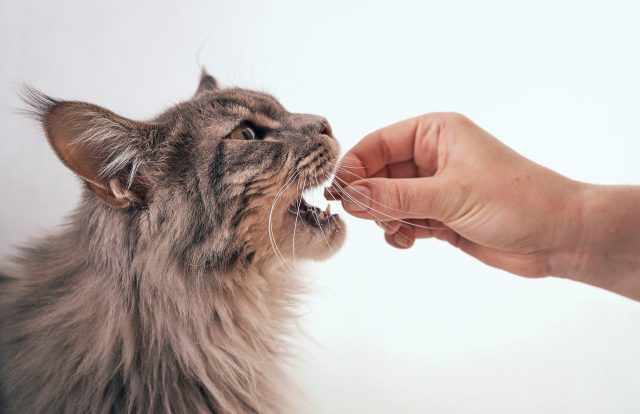
FAQs About Cat Treats for Sensitive Stomachs
What ingredients should I avoid in cat treats for sensitive stomachs?
When choosing cat treats for sensitive stomachs, avoid certain ingredients that can potentially trigger digestive issues or allergies. Here are some ingredients to steer clear of:
- Grains: Cats with sensitive stomachs often have difficulty digesting grains like wheat, corn, and soy. These ingredients can lead to digestive upset or allergic reactions. Look for grain-free treats or those with low grain content.
- Artificial additives: Artificial colors, flavors, and preservatives can be harsh on a cat’s digestive system. These additives may cause gastrointestinal disturbances or sensitivities. Opt for treats that are free from artificial ingredients.
- Fillers: Avoid treats containing excessive fillers, such as meat by-products, wheat gluten, or soybean meal. These fillers provide little nutritional value and may contribute to digestive issues.
- High-fat content: Fatty treats can be difficult for cats with sensitive stomachs to digest. Excessive fat content can lead to diarrhea or pancreatitis. Choose treats with moderate fat levels.
- Allergenic proteins: Cats can develop allergies to certain proteins, such as beef, chicken, or fish. If your cat has known food allergies or sensitivities, avoid treats that include these proteins. Look for hypoallergenic options with novel protein sources.
- Lactose: Most cats are lactose intolerant, meaning they lack the enzymes necessary to digest lactose, the sugar found in milk and dairy products. Avoid treats that contain dairy or lactose to prevent digestive discomfort.
- Excessive fiber: While fiber is essential for digestive health, too much can cause stomach upset in cats with sensitive stomachs. Look for treats with moderate fiber levels and avoid those with high-fiber content.
If you notice any adverse reactions or digestive issues, discontinue the treats and consult your veterinarian for further guidance.
How do I know if my cat has a sensitive stomach?
Identifying whether your cat has a sensitive stomach can sometimes be challenging, as symptoms can vary from cat to cat.
Here are some common signs that may indicate a sensitive stomach:
- Frequent vomiting: If your cat vomits frequently, especially after meals or when given treats, it could be a sign of a sensitive stomach. However, occasional vomiting alone may not necessarily indicate a sensitive stomach and could be caused by other factors.
- Diarrhea or loose stools: Cats with sensitive stomachs may experience diarrhea or loose stools, often accompanied by increased frequency and urgency to defecate. If you notice a change in your cat’s stool consistency or if they have frequent accidents outside the litter box, it could be a sign of digestive issues.
- Flatulence and excessive gas: Cats with sensitive stomachs may have increased flatulence or emit foul-smelling gas. If your cat passes gas more frequently or the odor is particularly unpleasant, it could indicate digestive sensitivity.
- Changes in appetite: A cat with a sensitive stomach may exhibit a decreased or finicky appetite. They might show disinterest in their regular food or treats or eat less overall due to gastrointestinal discomfort.
- Weight loss or poor weight gain: Digestive issues can lead to weight loss or difficulty gaining weight in cats. If your cat is losing weight despite a good appetite, it’s important to investigate the underlying cause.
- Lethargy or decreased activity: Cats with digestive discomfort may become lethargic or exhibit a decrease in usual activity levels. If your cat seems unusually tired or lacks energy, it could be linked to gastrointestinal issues.
If you notice any of these symptoms or suspect that your cat has a sensitive stomach, it’s essential to consult with a veterinarian.
Should I consult a veterinarian before choosing sensitive stomach cat treats?
Consulting a veterinarian before choosing sensitive stomach cat treats is highly recommended. A veterinarian can provide valuable insights into your cat’s specific dietary needs and any underlying health conditions that may contribute to their sensitive stomach. They can offer personalized recommendations, suggest appropriate brands or ingredients to look for, and guide you in selecting treats that are safe, nourishing, and suitable for your cat’s digestive sensitivities.
Can I give my cat regular treats if they have a sensitive stomach?
If your cat has a sensitive stomach, giving them regular treats is generally not advisable. Regular treats may contain ingredients that can exacerbate digestive issues or trigger allergies. Stick with treats specifically formulated for sensitive stomachs.
What are the signs of a treat not agreeing with my cat’s sensitive stomach?
When a treat doesn’t agree with your cat’s sensitive stomach, common signs to watch for include frequent vomiting, diarrhea or loose stools, excessive flatulence or gas, decreased appetite or finicky eating behavior, weight loss or poor weight gain, and lethargy or decreased activity levels. These symptoms indicate the treat may be causing gastrointestinal discomfort, and it’s important to discontinue its use.
How can I introduce new treats to my cat with a sensitive stomach?
When introducing new treats to a cat with a sensitive stomach, it’s essential to do so gradually. Start by offering a small portion of the new treat and monitor your cat’s reaction over the next 24-48 hours. Observe for any signs of digestive upset such as vomiting, diarrhea, or changes in appetite. If your cat tolerates the treat well, you can continue incorporating it into their diet.
However, discontinue the treat if any adverse reactions occur and consult your veterinarian for further guidance. A slow and cautious approach allows you to gauge your cat’s tolerance and ensure the new treat agrees with their sensitive stomach.
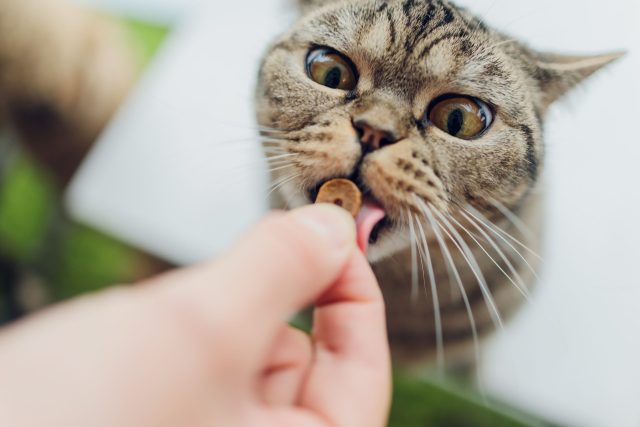
Final Thoughts
So, to sum it up, when choosing the best cat treats for sensitive stomachs, always prioritize high-quality ingredients, limited ingredient options, and ease of digestion. Treats that are grain-free, hypoallergenic, and free from artificial additives are excellent choices for cats with sensitive stomachs. Additionally, consulting with a veterinarian and considering your cat’s needs and preferences will help you make informed decisions to provide them with tasty and gentle treats that promote digestive health and overall well-being. With the right selection of treats, you can indulge your feline bestie while keeping their sensitive stomach happy and content.
[templatera id= “3493224”]

